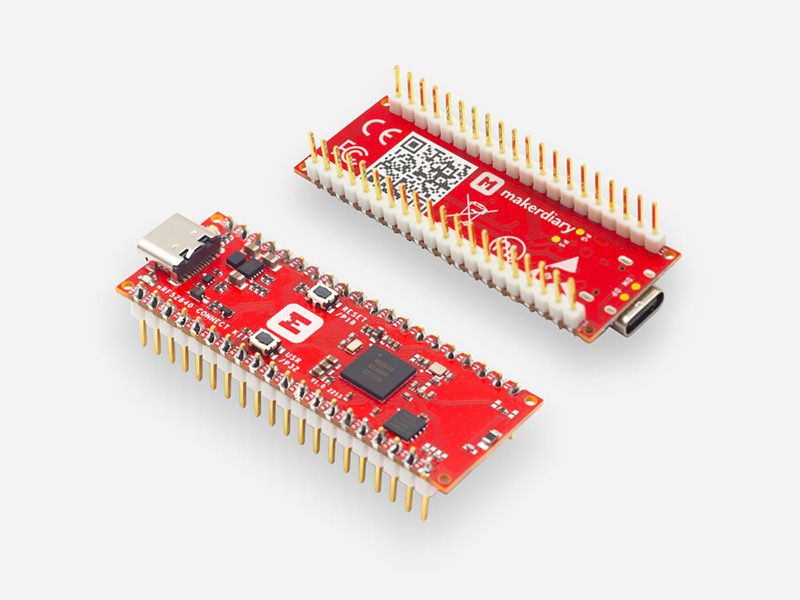
nRF52840 Connect Kit by MakerDiary
nRF52840 Connect Kit is an open-source prototyping kit designed for connected projects. It is built using the nRF52840 SoC, which has protocol support for Bluetooth LE, Bluetooth mesh, Thread, Zigbee, 802.15.4, ANT and 2.4 GHz proprietary stacks. It provides Arm TrustZone® CryptoCell cryptographic unit as well as numerous peripherals such as USB 2.0, NFC-A, GPIO, UART, SPI, TWI, PDM, I2S, QSPI, PWM, ADC, QDEC to support a wide range of applications.
The design is available in an easy-to-use form factor with USB-C and 40 pin DIP/SMT type, including up to 32 multi-function GPIO pins (7 can be used as ADC inputs) and Serial Wire Debug (SWD) port. It features RGB LED, Buttons, external 64 Mbit QSPI flash and flexible power management with various options for easily powering the unit from USB-C, external supplies or batteries, and also has Chip antenna and U.FL receptacle options to support various wireless scenarios.
nRF52840 Connect Kit supports nRF Connect SDK, which integrates the Zephyr RTOS, protocol stacks, samples, hardware drivers and much more. We also offer Python support, allowing you access hardware-specific functionality and peripherals with Python programming language.
Key Features
-
Nordic Semiconductor nRF52840 SoC
-
- 64 MHz Arm® Cortex-M4 with FPU
- 1 MB Flash + 256 KB RAM
- Bluetooth LE, Bluetooth mesh, Thread, Zigbee, 802.15.4, ANT and 2.4 GHz proprietary
- Arm TrustZone® Cryptocell 310 Security Subsystem
- 2.4 GHz Transceiver with +8 dBm TX Power
- GPIO, UART, SPI, TWI(I2C), PDM, I2S, QSPI, PWM, QDEC, 12-bit ADC support
- Integrated USB 2.0 Full-speed Controller
- Integrated NFC-A Tag
- Ultra low power 64 Mbit QSPI flash memory
- User programmable RBG LED and Buttons
- Up to 32 multi-function General Purpose IOs (7 can be used as ADC inputs)
- Arm Serial Wire Debug (SWD) port via edge pins
- Flexible power management with various options for easily powering the unit
- Wide input voltage range: 1.8 V to 5.5 V, output 3.3V and up to 2A when Input ≥ 2.3 V
- 3.3V IO Operating Voltage
- Reversible USB-C connector
- Available in Chip antenna and U.FL receptacle options
- 40 pin 55.88mm x 20.32mm (2.2” x 0.8”) DIP/SMT form factor
- Shipped with UF2 Bootloader supporting Drag-and-drop programming over USB drive
- Built on open source, supporting nRF Connect SDK, Zephyr RTOS, Python, etc.
Purchase
Contribute
Have some info to add for this board? Edit the source for this page here.
CircuitPython 10.1.3
This is the latest stable release of CircuitPython that will work with the nRF52840 Connect Kit. Use this release if you are new to CircuitPython.
On nRF boards, CircuitPython 8.2.0 and later require UF2 bootloader version 0.6.1 or later. Older bootloaders cannot load the firmware. See Update UF2 Bootloader below.
Modules included in this download
_asyncio _bleio _bleio (native) _pixelmap adafruit_bus_device adafruit_pixelbuf aesio alarm analogio array atexit audiobusio audiocore audiomixer audiomp3 audiopwmio binascii bitbangio bitmapfilter bitmaptools board builtins builtins.pow3 busdisplay busio busio.SPI busio.UART codeop collections countio digitalio displayio epaperdisplay errno fontio fourwire framebufferio getpass gifio hashlib i2cdisplaybus io jpegio json keypad keypad.KeyMatrix keypad.Keys keypad.ShiftRegisterKeys keypad_demux keypad_demux.DemuxKeyMatrix locale lvfontio math memorymap microcontroller msgpack neopixel_write nvm onewireio os os.getenv paralleldisplaybus pulseio pwmio rainbowio random re rgbmatrix rotaryio rtc sdcardio select sharpdisplay storage struct supervisor synthio sys terminalio tilepalettemapper time touchio traceback ulab usb_cdc usb_hid usb_midi vectorio warnings watchdog zlibIncluded frozen(?) modules: adafruit_ble, adafruit_hid, neopixel
Features: Bluetooth/BTLE, USB-C, Breadboard-Friendly, Castellated Pads
CircuitPython 10.2.0-alpha.1
This is the latest development release of CircuitPython that will work with the nRF52840 Connect Kit.
Alpha development releases are early releases. They are unfinished, are likely to have bugs, and the features they provide may change. Beta releases may have some bugs and unfinished features, but should be suitable for many uses. A Release Candidate (rc) release is considered done and will become the next stable release, assuming no further issues are found.
Please try alpha, beta, and rc releases if you are able. Your testing is invaluable: it helps us uncover and find issues quickly.
On nRF boards, CircuitPython 8.2.0 and later require UF2 bootloader version 0.6.1 or later. Older bootloaders cannot load the firmware. See Update UF2 Bootloader below.
Release Notes for 10.2.0-alpha.1
Modules included in this download
_asyncio _bleio _bleio (native) _pixelmap adafruit_bus_device adafruit_pixelbuf aesio alarm analogio array atexit audiobusio audiocore audiomixer audiomp3 audiopwmio binascii bitbangio bitmapfilter bitmaptools board builtins builtins.pow3 busdisplay busio busio.SPI busio.UART codeop collections countio digitalio displayio epaperdisplay errno fontio fourwire framebufferio getpass gifio hashlib i2cdisplaybus io jpegio json keypad keypad.KeyMatrix keypad.Keys keypad.ShiftRegisterKeys keypad_demux keypad_demux.DemuxKeyMatrix locale lvfontio math memorymap microcontroller msgpack neopixel_write nvm onewireio os os.getenv paralleldisplaybus pulseio pwmio rainbowio random re rgbmatrix rotaryio rtc sdcardio select sharpdisplay storage struct supervisor supervisor.get_setting synthio sys terminalio tilepalettemapper time touchio traceback ulab usb_cdc usb_hid usb_midi vectorio warnings watchdog zlibIncluded frozen(?) modules: adafruit_ble, adafruit_hid, neopixel
Features: Bluetooth/BTLE, USB-C, Breadboard-Friendly, Castellated Pads
Absolute Newest
Every time we commit new code to CircuitPython we automatically build binaries for each board and language. The binaries are stored on Amazon S3, organized by board, and then by language. These releases are even newer than the development release listed above. Try them if you want the absolute latest and are feeling daring or want to see if a problem has been fixed.
Previous Versions of CircuitPython
All previous releases of CircuitPython are available for download from Amazon S3 through the button below. For very old releases, look in the OLD/ folder for each board. Release notes for each release are available at GitHub button below.
Older releases are useful for testing if you something appears to be broken in a newer release but used to work, or if you have older code that depends on features only available in an older release. Otherwise we recommend using the latest stable release.
